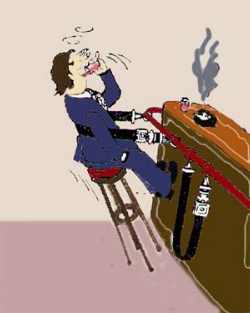The question presented, therefore, clearly is upon the constitutionality and propriety of the federal government assuming to enter into a novel and vast field of legislation, namely--that of providing for the care and support of all those, among the people of the United States, who by any form of calamity become fit objects of public philanthrophy. I readily, and, I trust, feelingly acknowledge the duty incumbent on us all, as men and citizens, and as among the highest and holiest of our duties, to provide for those who, in the mysterious order of Providence, are subject to want, and to disease of body or mind; but I cannot find any authority in the Constitution for making the federal government the great almoner of public charity throughout the United States. To do so would, in my judgment, be contrary to the letter and spirit of the Constitution, and subversive of the whole theory upon which the union of these States is founded. And if it were admissible to contemplate the exercise of this power for any object whatever, I cannot avoid the belief that it would in the end be prejudicial, rather than beneficial, in the noble offices of charity to have the charge of them transferred from the States to the federal government. Are we not too prone to forget that the federal Union is the creature of the States, not they of the federal Union? We were the inhabitants of colonies, distinct in local government one from the other, before the revolution. By that revolution, the colonies each became an independent State. They achieved that independence, and secured its recognition by the agency of a consulting body, which, from being an assembly of the ministers of distinct sovereignties, instructed to agree to no form of government which did not leave the domestic concerns of each State to itself, was appropriately denominated a Congress. When having tried the experiment of the confederation, they resolved to change that for the present federal Union, and thus to confer on the federal government more ample authority, they scrupulously measured such of the functions of their cherished sovereignty as they chose to delegate to the general government. With this aim, and to this end, the fathers of the republic framed the Constitution, in and by which the independent and sovereign States united themselves for certain specified objects and purposes, and for those only, leaving all powers not therein set forth as conferred on one or another of the three great departments--the legislative, the executive and the judicial-indubitably with the States. And when the people of the several States had, in their State conventions, and thus alone, given effect and force to the Constitution, not content that any doubt should in future arise as to the scope and character of this act, they engrafted thereon the explicit declaration that "the powers not delegated to the United States by the Constitution, nor prohibited by it to the States, are reserved to the States respectively, or to the people," can it be controverted that the great mass of the business of government, that involved in the social relations the internal arrangements of the body politic, the mental and moral culture of men, the development of local resources of wealth, the punishment of crimes in general, the preservation of order, the relief of the needy or otherwise unfortunate members of society, did, in practice, remain with the States; that none of these objects of local concern are by the Constitution expressly or impliedly prohibited to the States; and that none of them are, by any express language of the Constitution, transferred to the United States? Can it be claimed that any of these functions of local administration and legislation are vested in the federal government by any implication? I have never found anything in the Constitution which is susceptible of such a construction. No one of the enumerated powers touches the subject, or has even a remote analogy to it. The powers conferred upon the United States have reference to federal relations, or to the means of accomplishing or executing things of federal relation. So, also, of the same character are the powers taken away from the States by enumeration. In either case, the powers granted, and the powers restricted, were so granted or so restricted only where it was requisite for the maintenance of peace and harmony between the States, or for the purpose of protecting their common interests, and defending their common sovereignty against aggression from abroad or insurrection at home.
President Franklin Pierce, 3 May 1854
You might embrace socialism - I reject it.
